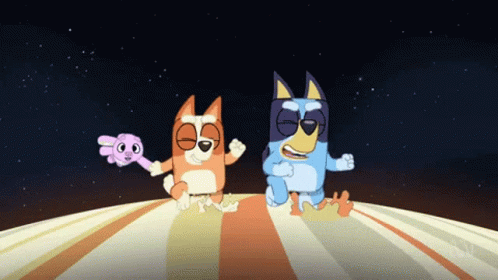Parents of children under 10 have most likely encountered the beloved Australian cartoon Bluey. Thanks to Disney+, the adventures of Bluey, her sister Bingo, and parents Chilli and Bandit have found an international audience. Best, the show’s short but plentiful episodes make it eminently bingeable. But what makes Bluey stand out in the crowded space of children’s programming on Disney+ is…

…The Intentional Lack of “Educational” Messaging.
There are plenty of good, even great, kids’ shows that deliver discrete, measurable nuggets of knowledge or moralizing in every episode. But the formula is embedded so deeply in the genre’s bedrock that even well-taught lessons—learning about colors or the Great Wall of China, for instance—are often trite. Joe Brumm, Bluey’s creator, set out to create a show with roots in the park, the living room, and the backyard, not the classroom.
That’s not to say that Bluey and Bingo never learn anything through their games of Daddy Butler or Grannies, though. Quite the opposite, actually, as Brumm told Perth Now in 2019: “There’s no counting in Bluey, there’s no learning this or that … just show ’em playing. It’s to show parents that the kids aren’t just mucking around. They’re learning to play, learning to share … and generally you can just put your feet up and let ’em do it.”
With no learning standards to achieve, Bluey’s a show that feels like a real family doing realistic things. That conceit lends the show a warmth that ballistic, overstimulated shows like Puppy Dog Pals and Mickey Mouse Clubhouse lack. Instead, each episode is simple, driven by games or curiosity, and, to quote the same interview with Brumm, demonstrate “the laughter and real warmth that you get as a family. To me, it’s very beautiful and I wanted to show that to the world.”
…Its Brilliant Use of Music.
Copyright-free classical music is a godsend for kids’ shows, especially when featured as a cornerstone of the show in question, like the awesome Little Einstein. It’s free (which keeps licensing costs down), it stimulates little ones’ brains, and is often genuinely beautiful. Bluey’s gifted composer, Joff Bush, takes famous snippets of famous classical pieces and reworks them into funny, sometimes touching little tunes.
Baroque composer Johann Pachelbel’s famous Canon in D (almost assuredly played at at least one wedding you’ve been to) shines in the first season episode “The Claw”, mixing straight homage in with a boppy EDM remix. Pyotr Tchaikovsky—composer of the musical score of The Nutcracker—gets an unexpected tip of the hat in the S2 episode “Ice Cream”. Bluey and her little sister Bingo, unable to decide how to share their treats, twirl around each other to Tchaikovsky’s “Waltz of the Flowers”.

But Bluey’s most effective use of classical music comes in “Sleepytime”, the midpoint episode of season 2. Bingo dreams big, leaving Earth behind for an interstellar tour of the cosmos. The episode is visually stunning, with surreal space imagery worthy of Adventure Time.
It’s also surprisingly moving, with Mum’s bedtime words of comfort—”Remember I’ll always be here for you, even if you can’t see me, because I love you.”—scored with a huge, magnificent arrangement of Gustav Holst’s “Jupiter” from The Planets suite. To kids their parents are the center of the universe; I’ve never seen a better expression of that elemental relationship.
…How Relatable—And Realistic—The Parenting Is.
Bluey first pinged onto my radar back in April 2020. We—me, my wife, and our then-one-year-old—were a month into the pandemic, locked down at home, and, honestly, loving all the family time. One day I turned on Bluey after bath time. I was focused on drying our toddler off, brushing hair, pulling on a shirt, when I heard Bluey’s dad respond to the question, “Can we play a game?” with, “As long as it’s one where I don’t have to move any part of my body or say anything with my mouth.”
The larger situation was grim at the time, but when else ever (in our lives, in US history, literally ever) would we get to spend months at home playing and laughing and being outside with no real-world obligations? Still, parenting is a full-time job, and we sometimes found ourselves weary travelers on the path to bedtime.
When Bluey’s dad said that to her, I felt it in my bones. Chilli and Bandit are more than just winks to the parental audience, though; they’re realistic, relatable, and, in their way, role models for us non-Blue Heeler parents.
Bluey’s mum and dad are sometimes tired, stretched thin, and squabble with each other. But they’re also loving with their kids and each other, supportive of Bluey and Bingo’s runaway creativity, and ready to play whatever game the kids cook up.
Take the S1 episode “Kids”, for example. Bluey and Bingo pretend to be a mom and toddler, respectively, at the grocery store, but accidentally hurt Dad’s feelings. When Bluey apologizes, he wraps her up in a hug and tells her he loves her. Warm music plays over the tender scene, only to stop abruptly as the camera shifts to show a stranger walk into frame, grab some paper towels, and cautiously back away. When they exit the frame, the music kicks back in.
That dynamic perfectly captures parenting in a nutshell. Does parenting look crazy from the outside? Yeah, a lot of the time. But within that little family circle exists a world of magic that’s hard to describe. Thankfully, we have Bluey to show it instead.

